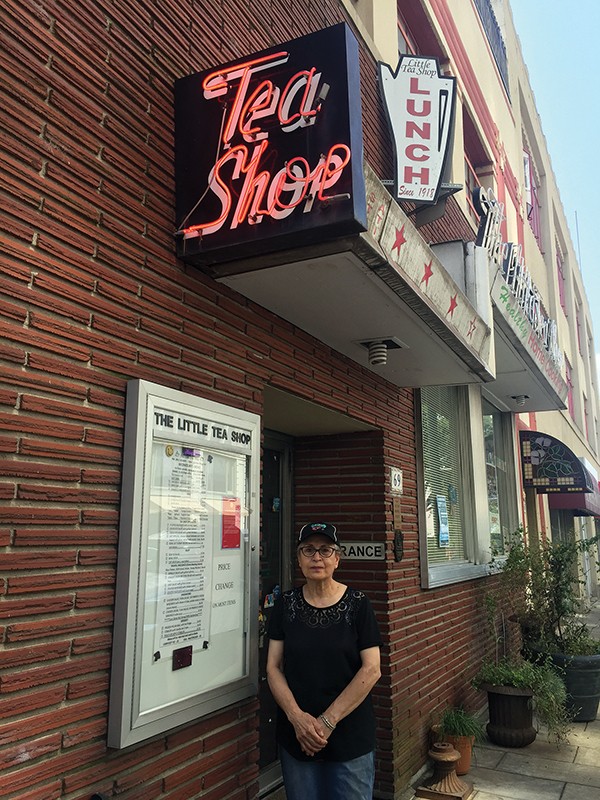While eating at another restaurant, Molly Wexler got the idea to make a documentary on an iconic Downtown lunch spot.
“It was exactly one year ago at the grand opening of the Global Café, and I saw Suhair,” says Wexler, referring to Suhair Lauck, Little Tea Shop owner.
Wexler told her husband, “It’s amazing that the Little Tea Shop is still around, and it hasn’t changed.”
Little Tea Shop has long been the “business person’s go-to place,” Wexler says. She told her husband, “Imagine the conversations they had there. If only the walls could talk. I’ll bet some of the biggest ideas that have changed the trajectory of Memphis happened at the Little Tea Shop. That would be a great short documentary.”
 Michael Donahue
Michael Donahue
Everybody loves Suhair Lauck and Little Tea Shop.
Now, Wexler is making Little Tea Shop’s walls talk through the film she’s making about the restaurant at 69 Monroe.
“I [researched] to see if it was worth moving forward with this idea. People got so excited. People love the restaurant. They love Suhair.”
Little Tea Shop “was founded by two women in 1918, which was unheard of,” says Wexler. Lillie E. Parham and Emily A. Carpenter “wanted a place for their friends to have lunch whenever they were shopping Downtown.”
They served tea sandwiches and “had a little shoebox at the front where they made change — a low-key operation. And, for a long time, that’s what it was,” Wexler says. “What I had trouble figuring out was when it became the business person’s place to go.”
She believes it was when Vernon Bell bought the restaurant in the 1940s. It was close to Cotton Row and the Memphis Cotton Exchange. Its popular Lacey Special — baked chicken, corn sticks, and rice— was named after cotton broker C. A. Lacey.
Customers included politicians, bankers, lawyers.
“I tried to talk to well-respected Memphians to find out if they remember some significant conversations,” says Wexler. “I got some great stories on film.”
Fred Davis, who is black, and Jed Dreifuss, who is Jewish, told Wexler about a breakfast group they formed there after Dr. Martin Luther King Jr. was assassinated. “[They] said it was such a scary time in Memphis, of course, but they wanted to do something about this to try to bring blacks and whites together.”
Why Little Tea Shop? “Blacks and whites had been eating there,” she says. “It was sort of a naturally integrated place. Both black and white people felt comfortable being there.”
Former Mayor A C Wharton told Wexler everyone “was on the same playing field. Everyone had respect for each other,” and it “felt like people hung up whatever it was that made them different from other people at the door — like the coat rack. You hung up your biases and came in and you were all the same.”
Since it began, women played an important role in the operation of Little Tea Shop. Betty Cunningham was manager when Bell owned it. Bell eventually sold the restaurant to his daughter, Sara Bell Stewart, who now owns Mortimer’s restaurant. Lauck bought the Little Tea Shop in 1982. “There’s a huge female component to the operation and staff of that restaurant,” Wexler says.
Lauck is the “third aspect” of the story, she adds. “Here you have a Palestinian immigrant who is the quintessential Southern hostess. She’s amazing.”
Wexler has raised $12,000 of the $20,000 she needs to complete the film through Fractured Atlas.
The documentary speaks to everybody. “A lot of people who are from other places will see this film and say, ‘I remember the restaurant like that in my town.’
“To me, it speaks to all the good in the world,” Wexler says. “Everybody is kind, happy, and they have some cornbread. We’d better say corn sticks.”
Find The Little Tea Shop Film on Facebook for more info and a link to the fund-raiser.